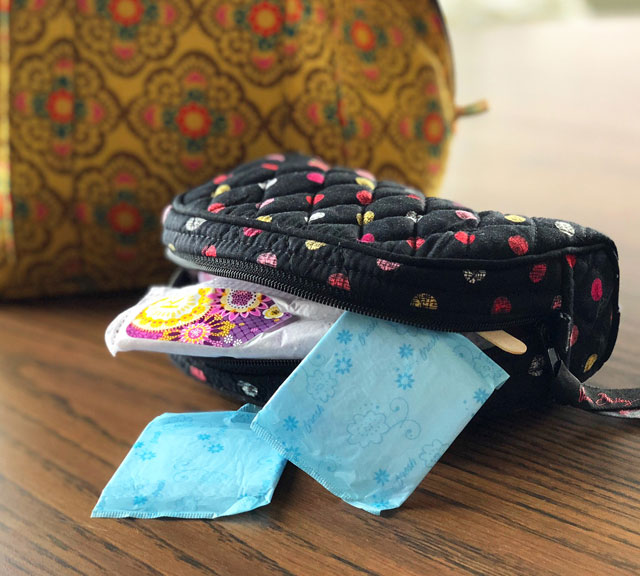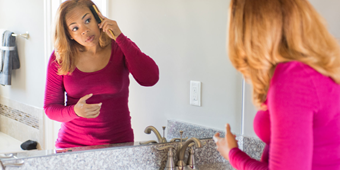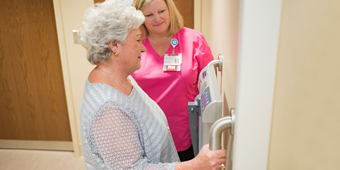First Period? Welcome to the Sisterhood!

Answer a few questions and we'll provide you with a list of primary care providers that best fit your needs.
Some girls are excited about starting their period. Some are nervous or embarrassed about it. Some have no clue what to expect or how to feel.
Getting your first period is part of getting older, and no matter how you feel, it soon becomes a normal part of life. It’s also something that you share with the women around you. It's an important rite of passage. It's exciting. It makes you part of a sisterhood. Here are the essentials on what to expect and how to deal with your first period.
What is a Period?
Every month or so, your ovaries release an egg into your uterus while the lining of your uterus builds up with blood and tissue. Your period is when the egg and the lining of your uterus come out of your vagina as menstrual blood. When you start your period, it means that your body is ready to make a baby.
Your first period can come as a surprise and may be different than you expect. The first period can last anywhere from two to seven days. It usually doesn't start off super heavy. You usually have a little light spotting and then that gets heavier throughout the course of the day.
The blood can vary in color – brown and pink, as well as shades of red. Your flow can be light or heavy. Blood clumps are also normal (so don’t worry if you see one). Some girls have cramps, but many don’t (and, in the future, a good diet and exercise can help if you do). If any blood gets on your panties, you can rinse it off in cold water in the bathroom sink before you throw it into the laundry.
Once you start your period, it can take some time for it to happen regularly. But, after a while, your body will get into a rhythm. Half of women are on a 28-day cycle and know when their period is coming. The other half have cycles that vary from 24 to 31 days. Every woman's cycle is unique to her. Young girls will often have irregular cycles, but usually they become more predictable.
Once you start your period, it can take some time for it to happen regularly.
When Do Most Girls Start Their Period?

Don’t worry if your friends start their periods before or after you do. The age at which girls get their first period varies quite a bit. Some can be as young as 9, and some can be as late as 15 or 16. You can expect that your period will come in the next year or so when your body starts changing. You start developing breasts and growing pubic hair and hair under your arms.
It can be good to talk with your mom about when she started because sometimes a girl's first period will come around the time that her mother got her first period. So it can be helpful for her mother to share her experience with her daughter. That can give her some idea of what to expect for what age she might get her first period. Sometimes it's completely different.
If you think you might be starting your period soon, you may want to keep a pad with you in your backpack or purse when you go out, just in case.
Period Products: What to Know
Most women deal with their periods by using pads or tampons, though some use other products.
A pad is a liner that attaches to the inside of your panty. A pad can be thick or slim, depending on the absorbency that you need (i.e. whether your period flow is light or heavy). You can also buy thicker, longer overnight pads for when you sleep. Every few hours, take a minute to check on your pad. Change it before it gets too full or starts to smell. You’ll probably want to start out wearing pads when you begin your period, so that you can get in the habit of checking and changing it out. However, you don’t want to wear a pad when you go swimming. And, in terms of “cons,” some girls think it feels bulky or uncomfortable.
A tampon goes inside your vagina to soak up the blood before it comes out. Some have smooth “applicators” to make it easier to insert. All tampons have a string at the bottom so that they can be pulled out and thrown away. It can take a little bit of time to get used to inserting a tampon, so it can be helpful to ask your mom or older sister to talk you through it before you attempt it.
It’s very important to change a tampon every four to eight hours. It’s rare, but if you leave a tampon in for too long, you may be in danger of Toxic Shock Syndrome (TSS). If you’re going to be sleeping for more than eight hours, it’s a better idea to wear a pad to bed. Tampons are great for swimming, and some women prefer to wear them during their whole period. It’s also important to change your tampon type based upon how heavy your flow is – thinner ones for lighter days and thicker ones for heavier days.
Some women use products that are natural or reusable – for example, menstrual cups, menstrual sponges or reusable pads. If you’re interested in using these options, you can find them online or at a health food store.
Overall, a very normal part of life. Soon it won’t feel like a big deal. The women in your life whom you love and trust can help you and answer your questions. You’ve got this!
Answer a few questions and we'll provide you with a list of primary care providers that best fit your needs.
Source: girlshealth.gov




